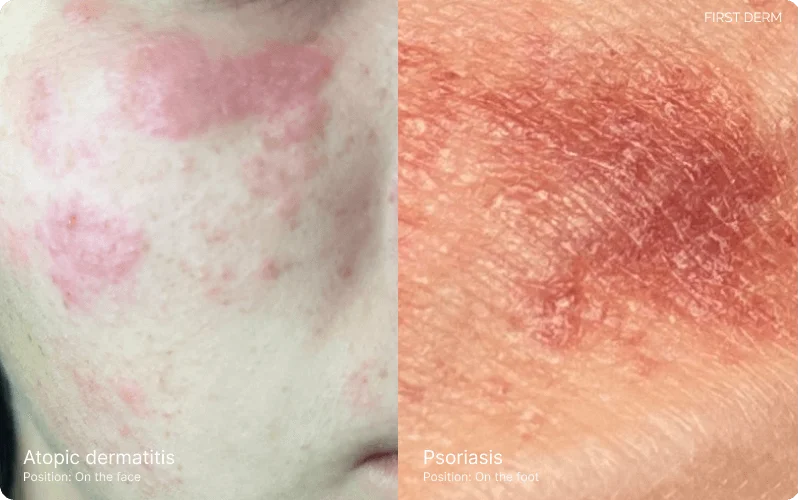Eczema (Atopic Dermatitis) vs. Psoriasis: Understanding the Differences

Key Takeaways
- Eczema and Psoriasis are Distinct: Eczema is often associated with allergies and manifests as itchy, red patches, primarily affecting children. Psoriasis is an autoimmune condition leading to rapid skin cell buildup and scaly patches.
- Chronic Conditions with Flare-ups: Both are chronic, with eczema involving periods of flare-ups and remission, and psoriasis characterized by cycles of clearing and worsening of symptoms.
- Impact Beyond Skin: Both conditions can significantly affect mental health and quality of life, with eczema impacting sleep due to itching and psoriasis associated with comorbidities like arthritis and depression.
- Different Triggers and Causes: Eczema flare-ups can be triggered by allergens and irritants, whereas psoriasis can be exacerbated by stress, infections, and certain medications.
- Treatment Approaches Vary: Treatment for eczema includes emollients and topical steroids, while psoriasis may be treated with light therapy, systemic medications, and biologics, emphasizing the need for personalized care.
Psoriasis and eczema are both conditions that lead to dryness and flakiness of the skin. Despite these similarities, their origins and management strategies diverge. Psoriasis stems from an autoimmune disorder, whereas eczema typically exacerbates due to specific environmental or internal factors.
Eczema (Atopic Dermatitis)
Eczema, also known as atopic dermatitis, is a common skin condition characterized by characterized by impaired skin barrier function, intense itching, recurrent eczematous lesions, and is often associated with other allergic conditions.[1]
This condition can affect individuals of any age, but it is most prevalent in children.
Eczema presents as red, dry, and itchy patches on the skin, and it can vary in severity from mild to severe.
In terms of how it works, retinol functions by accelerating the skin’s natural exfoliation process, which helps to unclog pores and prevent the formation of acne.[1]
Who is Most Susceptible to Eczema?
Individuals with a family history of allergic conditions, such as asthma or hay fever, are more susceptible to developing eczema. It is also more prevalent in children, with around 15 to 20% of Canadians suffering from eczema, and approximately 17% being diagnosed with the most common type, atopic dermatitis (AD).[2]
Why is Eczema Considered a Chronic Condition?
Eczema is considered a chronic condition because it tends to persist over time, with periods of flare-ups and remission. The exact cause of eczema is not fully understood, but it is believed to involve a combination of genetic and environmental factors.
This chronic nature can significantly impact an individual’s quality of life, leading to physical discomfort and emotional distress.
Psoriasis
Psoriasis is an autoimmune disease that causes the rapid buildup of skin cells, leading to the formation of flaky patches on the skin, which are covered with silvery-white or grey scales. These patches can appear anywhere on the body, but they are commonly found on the elbows, knees, scalp, and lower back.The condition can occur at any age but typically starts between the ages of 15 and 35.[4]
Psoriasis is characterized by the overproduction of skin cells, with new skin cells being produced and replaced every 3 to 4 weeks in healthy individuals. In psoriasis, this process takes only about 3 to 7 days, leading to the accumulation of skin cells and the formation of characteristic patches.[5]
Unlike other skin conditions, psoriasis is an immune-mediated disease, where the immune system mistakenly attacks healthy skin cells, leading to the rapid growth of skin cells and the development of psoriatic lesions.
Eczema vs. Psoriasis: A Symptomatic Comparison

eczema and psoriasis visual comparison
| Symptoms | Eczema | Psoriasis |
| Common Symptoms |
|
|
|
Distinctive Features
|
|
|
| Severe Symptoms |
|
|
Causes and Triggers for Eczema
While the exact cause of eczema is unknown, researchers believe that it involves a combination of genetic and environmental factors.[8] Eczema is characterized by an overactive immune system that responds to topical irritants or allergens, leading to inflammation and skin damage. Here are some of the causes and triggers for eczema:
- Genetic predisposition.
- Abnormal immune response.
- Skin barrier dysfunction.
- Environmental factors.
- Dysregulation of epidermal protein filaggrin.
Triggers for Eczema Flare-Ups
- Allergens: Dust mites, pet dander, pollen.
- Irritants: Harsh soaps, detergents, fragrances.
- Dry skin and insufficient moisturization.
- Stress and anxiety.
- Temperature changes: Hot or cold extremes.
- Microbial infections.
- Certain foods, especially in children.
- Hormonal changes: Puberty, pregnancy.
- Contact dermatitis from metals, latex, chemicals.
Understanding and identifying these causes and triggers is crucial for individuals with eczema to effectively manage and minimize the impact of the condition on their skin. Additionally, working with healthcare professionals can provide personalized guidance for eczema management.
Causes and Triggers for Psoriasis
Psoriasis is an autoimmune disease, where the immune system mistakenly attacks healthy skin cells, leading to the rapid growth of skin cells and the development of psoriatic lesions.[9] While the exact cause of psoriasis is unknown, researchers believe that genetics and the immune system play key roles.Here are some of the causes and triggers for psoriasis:
- Genetic predisposition.
- Immune system dysfunction.
- Environmental factors.
Triggers for Psoriasis Flare-Ups
- Infections (bacterial or viral).
- Injury to the skin (Koebner Phenomenon).
- Medications (lithium, beta-blockers, NSAIDs).
- Smoking and excessive alcohol consumption.
- Hormonal changes (puberty, pregnancy).
- Weather conditions (cold, dry weather).
- Certain foods (gluten, dairy).
- Alcohol consumption.
Psoriasis triggers can vary from person to person, and what may worsen psoriasis for one person may not have any impact on someone else.Identifying and avoiding triggers can help manage psoriasis symptoms and improve overall quality of life.
Treatment Options
While both conditions are chronic, their symptoms can be managed with proper care.
Eczema (Atopic Dermatitis) Treatment Options
- Topical Treatments: Emollients, corticosteroids, and calcineurin inhibitors are commonly used to reduce inflammation and relieve itching.[10]
- Oral Medications: In severe cases, oral corticosteroids or oral immunosuppressants may be prescribed to control symptoms.
- Phototherapy: Narrowband ultraviolet B (NB-UVB) light therapy can be effective for moderate to severe eczema.
- Biologic Medications: These are reserved for severe cases that don’t respond to other treatments.
Psoriasis Treatment Options
- Topical Treatments: Corticosteroids, vitamin D analogs, and retinoids are used for mild to moderate psoriasis to reduce inflammation and slow down skin cell growth.[11]
- Light Therapy (Phototherapy): This involves exposing the skin to ultraviolet light under medical supervision.
- Systemic Medications: For moderate to severe psoriasis, oral or injected medications that affect the whole immune system may be prescribed.
- Biologic Medications: These target specific parts of the immune system and are used for moderate to severe psoriasis that hasn’t responded to other treatments.
Can Someone Have Both, Eczema and Psoriasis?
Yes, it is possible for someone to have both eczema and psoriasis simultaneously. While these are distinct skin conditions with different underlying mechanisms, they share some common features and can coexist in the same individual. This phenomenon is known as “comorbidities,” where an individual experiences multiple chronic conditions simultaneously.[12]
While it is rare, it is possible for someone to have both eczema and psoriasis. According to research, about 7% of people with psoriasis also have eczema.[13] Genetic factors, immune system dysregulation, and environmental triggers contributing to the development of both conditions.
References
- Langan SM, Irvine AD, Weidinger S. Atopic dermatitis. The Lancet. 2020;396(10247):345-360. doi: https://doi.org/10.1016/s0140-6736(20)31286-1
- Clinical Review. Nih.gov. Published December 2023. Accessed February 8, 2024. https://www.ncbi.nlm.nih.gov/books/NBK599845/
- S. Lewis-Jones. Quality of life and childhood atopic dermatitis: the misery of living with childhood eczema. International Journal of Clinical Practice. 2006;60(8):984-992. doi: https://doi.org/10.1111/j.1742-1241.2006.01047.x
- Christopher, Jonathan. Pathogenesis and clinical features of psoriasis. The Lancet. 2007;370(9583):263-271. doi: https://doi.org/10.1016/s0140-6736(07)61128-3
- Ogawa E, Sato Y, Akane Minagawa, Okuyama R. Pathogenesis of psoriasis and development of treatment. The Journal of Dermatology. 2017;45(3):264-272. doi: https://doi.org/10.1111/1346-8138.14139
- Maria, Bruno, Gleison Vieira Duarte. Psoriasis: classical and emerging comorbidities. Anais Brasileiros de Dermatologia. 2015;90(1):9-20. doi: https://doi.org/10.1590/abd1806-4841.20153038
- Wu JJ, Feldman SR, Koo J, Marangell LB. Epidemiology of mental health comorbidity in psoriasis. Journal of Dermatological Treatment. 2017;29(5):487-495. doi: https://doi.org/10.1080/09546634.2017.1395800
- What is Eczema? National Eczema Association. Published September 26, 2023. Accessed February 9, 2024. https://nationaleczema.org/eczema/
- Psoriasis: Causes & Triggers. Psoriasis.org. Published 2022. Accessed February 9, 2024. https://www.psoriasis.org/causes/
- Ryoji Tanei. Atopic Dermatitis in Older Adults: A Review of Treatment Options. Drugs & Aging. 2020;37(3):149-160. doi: https://doi.org/10.1007/s40266-020-00750-5
- Leman J, Burden A. Treatment of severe psoriasis with infliximab. Therapeutics and Clinical Risk Management. 2008;Volume 4:1165-1175. doi: https://doi.org/10.2147/tcrm.s3094
- Marlies Wakkee, Nijsten T. Comorbidities in Dermatology. Dermatologic Clinics. 2009;27(2):137-147. doi: https://doi.org/10.1016/j.det.2008.11.013
- Menter A, Gottlieb A, Feldman SR, et al. Guidelines of care for the management of psoriasis and psoriatic arthritis. Journal of the American Academy of Dermatology. 2008;58(5):826-850. doi: https://doi.org/10.1016/j.jaad.2008.02.039
Ask a Dermatologist
Anonymous, fast and secure!

The Specialist doctor from the University Hospital in Gothenburg, alumnus UC Berkeley. My doctoral dissertation is about Digital Health and I have published 5 scientific articles in teledermatology and artificial intelligence and others.

